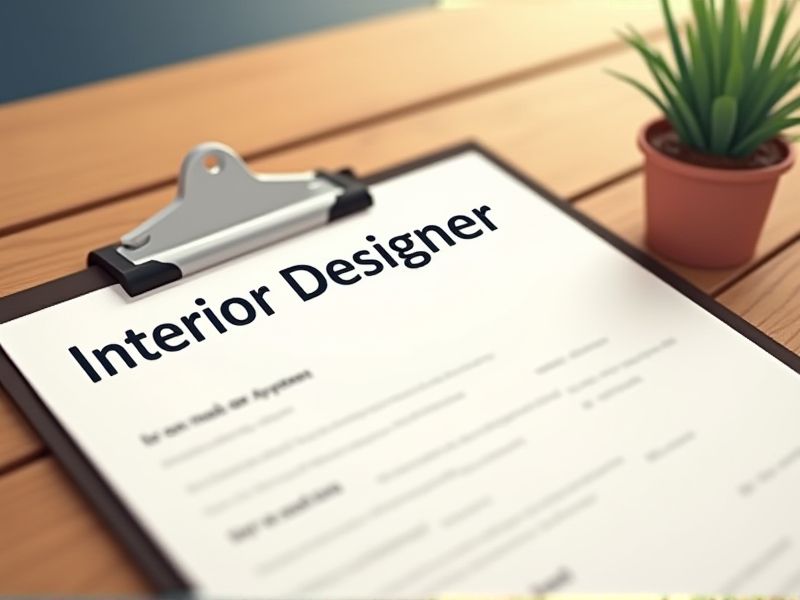
Licensed Interior Designers require specific certifications to ensure they meet industry standards and regulations, which enhances their professional credibility. These credentials are vital for verifying their expertise in creating safe, functional, and aesthetically pleasing environments, complying with local building codes and ethical guidelines. Obtaining such certifications often reflects the designer's commitment to continuous learning and staying updated with the latest trends and practices. Here are several critical certifications you may need as a Licensed Interior Designer.
NCIDQ Certification
Achieving NCIDQ Certification ensures that a licensed interior designer meets industry-standard qualifications, enhancing credibility and trust with clients. This certification confirms the designer's competence in critical areas such as building codes, safety standards, and ethical practices. Employers often prefer or require the certification, which can lead to better job opportunities and advancement in the field. Some states mandate NCIDQ Certification for licensure, impacting the designer's ability to practice legally across different regions.
LEED Accredited Professional (LEED AP)
Gaining LEED Accredited Professional status positions a licensed interior designer to better address sustainability challenges in their projects. As environmental regulations become stricter, a LEED AP credential helps in navigating and complying with these standards effectively. This expertise often results in increased project efficiency and potential cost savings by integrating sustainable design practices. Clients increasingly demand eco-friendly solutions, making LEED accreditation a valuable asset in meeting market needs and enhancing a designer's competitive advantage.
WELL Accredited Professional (WELL AP)
A WELL Accredited Professional (WELL AP) equips a licensed interior designer with knowledge about health-focused building standards, influencing design choices that enhance occupant well-being. This accreditation aligns with increasing market demands for sustainable and wellness-oriented interiors, giving designers a competitive edge. With WELL AP credentials, designers can adeptly navigate standards that positively impact air, water, light, and comfort, crafting spaces conducive to improved health outcomes. Enabling interior designers to implement these principles ensures designs that are not only aesthetically pleasing but also beneficial for physical and mental health.
Certified Interior Designer (CID)
Certified Interior Designers (CIDs) enhance credibility and trust, reassuring clients with nationally recognized qualifications and adherence to industry standards. Possessing a CID often leads to increased job opportunities due to the demonstrated commitment and verified expertise in interior design. The certification process improves a designer's skill set, providing up-to-date knowledge and best practices, which directly influences project success and client satisfaction. Licensed Interior Designers benefit from the professional network and continuing education opportunities provided through CID membership, fostering career growth and innovation.
Certified Sustainable Interior Designer (CSID)
A Certified Sustainable Interior Designer ensures that design projects incorporate eco-friendly materials, reducing environmental impact. Their expertise in sustainable practices can lead to energy-efficient designs, which helps lower utility costs. They provide knowledge on utilizing renewable resources and innovative materials, fostering healthier indoor environments. Hiring a CSID aligns with increasing consumer demand for sustainable living and can enhance a firm's market competitiveness.
Certified Aging-in-Place Specialist (CAPS)
The rise in the aging population increases the demand for homes designed for accessibility, necessitating specialized knowledge from Certified Aging-in-Place Specialists (CAPS). Licensed Interior Designers benefit from CAPS training as it equips them with the skills to create functional and safe environments for elderly clients. Data shows that well-designed living spaces can significantly reduce the risk of accidents and improve quality of life for seniors. Integrating CAPS expertise, designers can better address the specific challenges of aging while adding value to their professional services.
Autodesk Certified Professional (AutoCAD/Revit)
Being an Autodesk Certified Professional in AutoCAD or Revit equips a licensed interior designer with advanced technical skills, which enhances design accuracy and efficiency through sophisticated software tools. This certification signifies a high level of proficiency, giving clients and employers confidence in the designer's ability to deliver precise and innovative solutions. Mastery of these tools can streamline project workflows, reducing both time and potential errors in the design phase. The certification often results in increased career opportunities and competitiveness in the job market due to the recognized expertise in industry-standard software.
Adobe Certified Expert (ACE)
Acquiring an Adobe Certified Expert (ACE) credential enhances a licensed interior designer's proficiency in industry-standard design software, which directly improves the quality of visual presentations and project renderings. This certification validates the designer's advanced skills, increasing client trust and potentially expanding business opportunities in a competitive market. Mastery of Adobe tools streamlines the design process, allowing for more efficient project revisions and client approvals. As digital design becomes increasingly integral to the field, maintaining expertise through certifications like ACE ensures that the designer remains relevant and competitive.
Project Management Professional (PMP)
Securing a PMI Project Management Professional (PMP) certification enhances a licensed interior designer's credibility and project execution skills, leading to more efficacious management of complex projects. The certification provides standardized methodologies and best practices that reduce project risks and optimize resource allocation. Clients perceive PMP-certified professionals as more reliable due to their structured approach and commitment to project deadlines and budgets. Demand for PMP-certified designers increases as businesses prioritize efficiency and accountability in design project management.
Building Information Modeling (BIM) Certification
Building Information Modeling (BIM) Certification equips licensed interior designers with advanced skills for managing digital design processes, improving project efficiency. Increased demand for integration of architectural, structural, and MEP systems necessitates proficiency in BIM for accurate project coordination. Certification demonstrates a designer's capability to leverage cutting-edge technology for more precise space planning and resource management. Clients and firms increasingly prefer designers with BIM expertise, aligning with industry standards and expectations for comprehensive project delivery.
Summary
When you, as a Licensed Interior Designer, obtain additional certifications, your marketability increases significantly. You gain a competitive edge, attracting high-profile clients and projects. Certification often leads to better job prospects and opportunities for career advancement. Enhanced knowledge and skills from these certifications can improve your design quality, leading to higher client satisfaction and increased referrals.
